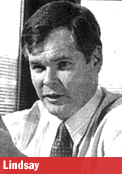Dear
Impresario: Put the money into high-impact programs, but play hard-ball
with budgets
In 1995, Current asked three of public TV's highly
regarded program-makers to write "Dear Impresario" letters
to the next chief programmer at PBS--a position then vacant. John
Lindsay is vice president/director of television productions at
Oregon Public Broadcasting, Portland.
Originally published in Current, May 29, 1995
When I was first asked to write this note advising the future PBS editor-in-chief
of programming, it sounded like fun. But after I found that I was supposed
to write about things like the audience segments PBS should target, the
levels of "brow" PBS should aim for and how the programming
impresario should spend discretionary money, the assignment began to sound
kind of dull.
So I came up with a solution. I decided to do what producers traditionally
do under circumstances like these. I'll ignore the commissioning editor
(Current) and write about the things I'd want to write about. Some
traditions deserve to be protected.
So, Mr./Ms. Editor-in-Chief, you're moving to Washington and you're thinking
about four things: (1) the funding crisis in the system, (2) the clarity/lack
of clarity of the PBS "vision," (3) how to gain the respect
and cooperation of all the disparate factions vying for programming dollars,
and (4) where to buy a house in Alexandria. Given (1), (2) and (3), I
have one piece of advice about (4): rent ... don't buy.
While my station (Oregon Public Broadcasting) does produce some shows
for the national schedule, I don't feel I have the level of experience
to provide you with the kind of advice you're going to get from people
working at stations like WGBH, WETA or WNET. But OPB is representative
of a number of stations that contribute to a fraction of the schedule.
So, in addition to advising you on your real-estate options, I do have
a few serious pieces of advice.
First and foremost, I hope you'll put as much money as you can into high-impact
primetime strands and a few extraordinary limited series. The primetime
schedule, in my opinion, is where we most need to focus our system's image
and identity. Please spend your money on the best of the best, regardless
of where those programs are produced. Please also see to it that PBS promotes
the hell out of those top-notch shows. The problem is, of course, your
scheduling selections will be influenced by PBS politics.
About three months ago I took my 11-year-old son to a Jim Carey movie
called Dumb and Dumber. For some strange reason, I began thinking
about PBS politics in the middle of that movie. As a person who's spent
most of his career outside of public television, I'm fascinated and appalled
by the turf fights within the system. The various factions seem so obsessed
with maintaining their own prerogatives that a kind of system-wide self-paranoia
seems to have developed.
I'd really like to know how you see your role in the midst of all these
warring factions. I'd also like to advise you to pay great attention to
the production budgets for those high-impact/high-priced shows you'll
be asked to fund. I hope you have had personal experience as a television
producer or director. If you've been down that road, there's a chance
you recognize waste and inefficiency when you see it. I'm not suggesting
that you "cheap-out" production budgets in a way that reduces
the quality of programming. I am, however, suggesting that there are millions
of dollars to be saved by distinguishing production fat from production
muscle. Given that you're going to face smaller NPS budgets in the future,
you will miss an opportunity if you don't tackle this issue head-on.
Playing hard-ball with the budgets could gain you a lot of dollars to
invest in other high-quality productions. I'm also hoping you'll fight
to enforce a uniform primetime schedule. While some progress has been
made in this area, there's still great resistance at the station level.
While much of the argument for schedule continuity has centered on fundraising,
I believe a uniform, reliable national primetime schedule will make it
much easier for you, as editor-in-chief, to create a focused national
identity for PBS.
It would also help those of us trying to produce shows for the national
schedule to know how you're going to define programming success. Is it
ratings? Is it demographics? Is it mission? While it's obviously a blend
of all three, producers will do a better job of getting you what you need
if you know what it is. Finally, don't program by compromise. Stand up
for what you believe in. I'm one of those people who admired your predecessors.
Jennifer Lawson and John Grant took risks. They weren't afraid to experiment.
They had a focused vision of PBS. Some of their decisions turned out well.
Others didn't. But they were true leaders. I miss them. I want to be able
to say the same about you someday.
Web page created July 5, 1999
Copyright 1995, Current Publishing Committee
[an error occurred while processing this directive]
![]()
